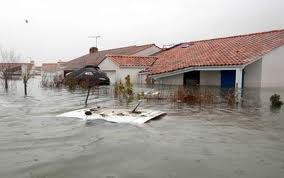
The Will Of God
“Fire, and hail; snow, and vapours; stormy wind fulfilling his word.”
Psalms 148:8
Perilous Times and Climate Change
French villagers hit by floods fight demolition of hundreds of 'black zone' homes
Storm Xynthia battered the French coast in February, but the residents are fighting the government's plan to force them out.
By Harriet Alexander in La Faute-Sur-Mer
Published: 7:08PM BST 17 Apr 2010
Georgette and Jacques Voyer lovingly constructed their home brick by brick, building a pretty bungalow perched on a sandy ridge among pine trees overlooking a vineyard.
Now the French government intends to flatten it. The property lies in a "black zone" damaged by terrible flooding in storm Xynthia in February, France's worst natural disaster for decades. Some 53 people died as 100mph winds whipped up huge waves that battered the coast.
Yet Mrs Voyer, 61, is adamant that her beloved home was untouched by the floodwater, and insists that she will not let demolition begin.
"If they come to bulldoze my house, then they will have to bulldoze me first," she said defiantly as her husband, a retired mechanical engineer, nodded in agreement. "There was no water inside our house at all. We are not flood victims. Yet they say it is now unsafe and must be destroyed."
The Voyers are not the only ones whose home is under threat despite having been spared the floodwater. It is one of a list of 1,510 properties scheduled for destruction in "black zones", affected areas in which everything will be levelled. The planned demolition will be one of the largest France has ever known.
The government has insisted that the drastic order must be carried out to ensure residents' safety because some properties have been badly damaged, and others have been shown to be vulnerable to future flooding.
"The state and the local authorities do not have the right to risk letting people return to areas where they could be in mortal danger," said the French prime minister, François Fillon, on Tuesday.
Residents beg to differ. Families who have made their homes in some of the most picturesque parts of unspoiled south-west France insist that many of their properties were in fact untouched by the floods. They accuse the government of over-reaction, amidst confusion over how compensation will be paid and claims that "black zones" have been drawn arbitrarily.
A mood of anger is spreading along the small coastal communities in the Charente-Maritime and Vendée regions, along the coast from La Rochelle. Law-abiding middle-class families like the Voyers insist they will not go. "You could put a million euros on the table, and we would not leave," said Mrs Voyer.
Many refuse to accept that their homes are now unsafe which they have lived in for decades.
On Friday Mrs Voyer joined a protest outside the regional government offices in La Roche-Sur-Yon, along with other residents from her village of La Faute-Sur-Mer. It was part of a wave of protests that have confronted regional governments since Mr Fillon's announcement on April 13. Waving flags, carrying banners, and draped in black bin bags to represent the black zones, a vocal group of 300 residents and supporters held a demonstration at the Prefecture to show their displeasure.
Their cause has become a political one, taken up with gusto by local mayors and opposition leaders. President Nicolas Sarkozy's long-standing foe Ségolène Royal - his Socialist opponent in the 2007 presidential election and now regional governor of neighbouring Poitou-Charentes -- even joined the debate, calling the decision to bulldoze "very brutal".
Janet Fox, 52, from Cheshire, bought her house in the village of Charron four years ago to run as a gite. With her husband Trevor, 55, who still commutes to Britain for his job as a telecommunications engineer, she spent over £100,000 renovating the elegant white-washed property. It should be a lucrative business - she charges up to £2,000 a week for the luxurious five bedroom villa. But their property is also in a "black zone" and could soon be pulled down.
"We were booked up for the summer," she said, her eyes welling with tears as she picked at the shreds of the gazebo in the garden. "At first, we just thought we'd put on our wellies and clear it up. But then we heard it might be knocked down. I couldn't sleep when I heard the news."
The small oyster-fishing village of Les Boucholeurs is strewn with banners claiming "Let us live" and "We are staying". Pastel-coloured houses with shutters on which the paint has gently faded look out across the oyster beds. Tractors tow boats along the narrow cobbled streets, taking the weather-beaten fishermen who have lived in the village for generations out to sea to harvest their oysters.
"We want to be protected, but we want to stay," said Sylvie Auditeau, 50, who runs an oyster business. "In the village the lines between the black zone and the yellow zone are so arbitrary. Why did no one ask us what we thought?"
The mayor of Châtelaillon Plage, Jean-Louis Leonard, last week took the complaints of his constituents -- including Les Boucholeurs -- to the French president. The two lunched at the Elysee Palace, while Mr Leonard told Mr Sarkozy of the anger welling up among the costal communities.
"The storm caused massive damage; that is undeniable," Mr Leonard explained."But the methods used in the aftermath were highly questionable. There was no regional consultation, and the decision was
abhorrent."
Mr Sarkozy said he would try to help if he could, Mr Leonard said.
At the end of last week, he and his fellow mayors were attempting to negotiate a compromise, to allow residents of the "black zone" to choose to leave with full compensation -- or stay put, and have the safety of their houses assessed.
But residents are unconvinced. "They're mocking the victims," said Yannick Lange of the Faute-Sur-Mer victim's association. "We are ready for a fight."